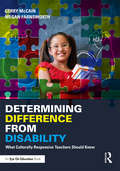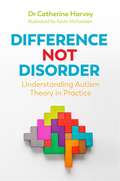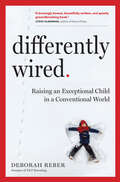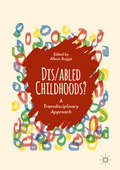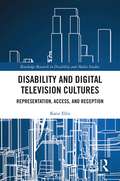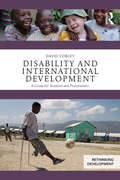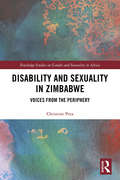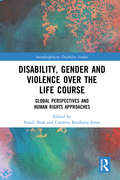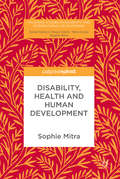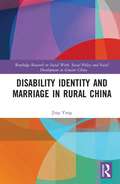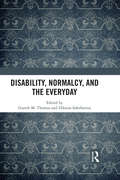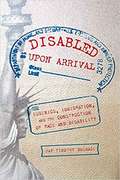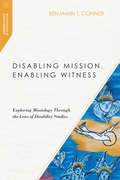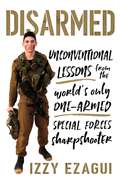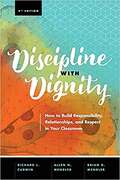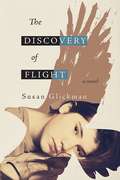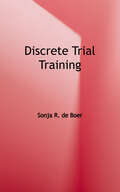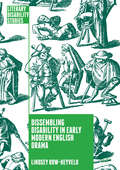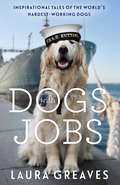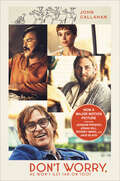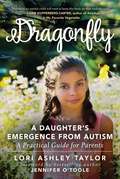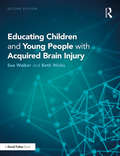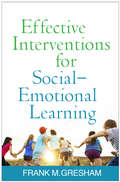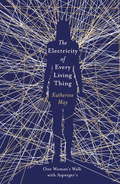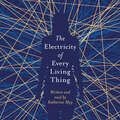- Table View
- List View
Determining Difference from Disability: What Culturally Responsive Teachers Should Know
by Gerry McCain Megan FarnsworthThis essential book offers clear guidelines for determining if the Culturally Linguistically Diverse (CLD) students / English Language Learners (ELL) in your general education classroom are experiencing typical language differences, learning disabilities, or both. By combining helpful case-studies with insightful research, the authors provide a framework for differentiating instruction that uses culturally appropriate interventions to build upon student strengths while creating a foundation for further learning and achievement. You will discover how to: Connect your own and your students’ cultural assets to classroom content; Review language acquisition stages and design corresponding instruction; Collaborate with peers and discuss the realities of reaching out for support and problem solving; Choose effective and appropriate instructional strategies based on documentation of data through progress monitoring; Move from a traditional behavioristic perspective to a more culturally responsive perspective; Identify patterns in formal assessments and informal instruction in order to distinguish between language differences and learning disabilities. In addition, the book includes a number of activities and graphs that can be implemented immediately in any classroom. Many of these materials can be downloaded for free from the book’s product page: www.routledge.com/9781138577756.
Difference Not Disorder: Understanding Autism Theory in Practice
by Dr Catherine Harvey Kevin McFaddenInterventions and educational approaches for children with autism spectrum disorders have developed in response to the different models for how autism has been constructed and understood. This book explores the evolving theories on autism and how these have impacted the interventions and outcomes in education. Drawing on 30 years of professional experience and detailed research, Harvey exposes the myths around autism, advocates for understanding autism as difference rather than impairment, and provides practical guidance on teaching and learning, behaviour management, addressing sensory and physical needs of children with ASD. This accessible overview shows how to put autism research into practice, learn from historic mistakes and create the most supportive environment for children on the autism spectrum.
Differently Wired: Raising an Exceptional Child in a Conventional World
by Deborah ReberToday millions of kids are stuck in a world that doesn't respect, support, or embrace who they really are—these are what Deborah Reber is calling the “differently wired” kids, the one in five children with ADHD, dyslexia, Asperger’s, giftedness, anxiety, sensory processing disorder, and other neurodifferences. Their challenges are many. But for the parents who love them, the challenges are just as hard—struggling to find the right school, the right therapist, the right parenting group while feeling isolated and harboring endless internal doubts about what’s normal, what’s not, and how to handle it all. But now there’s hope. Written by Deborah Reber, a bestselling author and mother in the midst of an eye-opening journey with her son who is twice exceptional (he has ADHD, Asperger’s, and is highly gifted), Differently Wired is a how-to, a manifesto, a book of wise advice, and the best kind of been-there, done-that companion. On the one hand it’s a book of saying NO, and how it’s time to say no to trying to fit your round-peg kid into society’s square holes, no to educational and social systems that don’t respect your child, no to the anxiety and fear that keep parents stuck. And then it’s a book of YES. By offering 18 paradigm shifts—what she calls “tilts”— Reber shows how to change everything. How to “Get Out of Isolation and Connect.” “Stop Fighting Who Your Child Is and Lean In.” “Let Go of What Others Think.” “Create a World Where Your Child Can Feel Secure.” “Find Your People (and Ditch the Rest).” “Help Your Kids Embrace Self-Discovery.” And through these alternative ways of being, discover how to stay open, pay attention, and become an exceptional parent to your exceptional child.
Dis/abled Childhoods?
by Allison BoggisThis edited collection explores the intersectionality of childhood and disability. Whereas available scholarship tends to concentrate on care-giving, parenting, or supporting and teaching children and young people with special educational needs and disabilities, the contributors to this collection offer an engaging and accessible insight into childhoods that are impacted by disability and impairment. The discussions cut across traditional disciplinary divides and offer critical insights into the key issues that relate to disabled children and young people's lives, encouraging the exploration of both disability and childhoods in their broadest terms. Dis/abled Childhoods? will be of interest to students and scholars across a range of disciplines including Special Educational Needs; Childhood Studies; Disability Studies; Youth Studies; and Health and Social Care.
Disability and Digital Television Cultures: Representation, Access, and Reception (Routledge Research in Disability and Media Studies)
by Katie EllisDisability and Digital Television Cultures offers an important addition to scholarly studies at the intersection of disability and media, examining disability in the context of digital television access, representation and reception. Television, as a central medium of communication, has marginalized people with disability through both representation on screen and the lack of accessibility to this medium. With accessibility options becoming available as television is switched to digital transmissions, audience research into television representations must include a corresponding consideration of access. This book provides a comprehensive and critical study of the way people with disability access and watch digital TV. International case studies and media reports are complimented by findings of a user-focused study into accessibility and representation captured during the Australian digital television switchover in 2013-2014. This book will provide a reliable, independent guide to fundamental shifts in media access while also offering insight from the disability community. It will be essential reading for researchers working on disability and media, as well as television, communications and culture; upper-level undergraduate and postgraduate students in cultural studies; along with general readers with an interest in disability and digital culture.
Disability and International Development: A Guide for Students and Practitioners (Rethinking Development)
by David CobleyDespite growing evidence of a close and complex relationship between disability and poverty, development policy, planning and programming has often failed to take full account of the concerns of disabled people. However, following the 2006 UN Convention on the Rights of Persons with Disabilities and the post-2015 sustainable development agenda, which promises to ‘leave no one behind’, there have been increasing calls from governments and development agencies for disability to be mainstreamed into all development planning. Disability and International Development provides a comprehensive overview of key themes in the field of disability and development, including issues around identity, poverty, disability rights, education, health, livelihoods, disaster recovery and approaches to researching disability. The book engages with relevant theory and draws on existing literature in the field, as well as the author’s own research and teaching experience, to explore key issues using a range of examples taken from around the world. Written in an accessible and engaging style to suit both students and practitioners, the book also includes a wide range of reflection exercises, discussion questions and further reading suggestions, making it the perfect introduction to disability and international development.
Disability and Sexuality in Zimbabwe: Voices from the Periphery (Routledge Studies on Gender and Sexuality in Africa)
by Christine PetaDisabled women represent one of the most marginalised minority groups in the world, hence they are largely silent while their sexuality is ignored, suppressed, forbidden and buried underneath the carpet. Until recently, most of the Global Northern published literature on the subject of the sexuality of disabled women has predominantly been constructed from hearsay and second-hand narratives in studies which draw from the perspectives of parents, service providers and advocates, without much consultation of the relevant women. By facilitating the voice of disabled women in Zimbabwe and illuminating their experiences of sexuality, this book hopes to shift the experiences of sexuality of disabled women from the periphery of society to the fore. Disability and Sexuality in Zimbabwe presents original research on an issue that is thus far not found in local research data. Whilst addressing the paucity of literature on the subject, the book informs policy and practice and enhances the existing body of knowledge by making recommendations towards the development of a disability and sexuality framework that is rooted in the African context. This book is of interest to students and scholars of African studies, disability studies, sociology, psychology, social work, nursing, education studies, geography, women’s and gender studies and interdisciplinary studies. Additional audiences include a wide range of health, social care, and educational professionals and practitioners, as well donors, disabled people’s organisations, charities, government departments, NGOs, supranational organisations, and policy makers
Disability, Gender and Violence over the Life Course: Global Perspectives and Human Rights Approaches (Interdisciplinary Disability Studies)
by Sonali Shah Caroline Bradbury-JonesThis is the first book to explore the interplay of disability, gender and violence over the life course from researcher, practitioner and survivor perspectives. It gives due weight to the accounts of disabled children and adults who have survived institutional or individual violence, evidencing barriers to recognition, disclosure and reporting. Written by disabled and non-disabled women from around the world, Disability, Gender and Violence over the Life Course addresses the dearth of voices and experiences of disabled women and girls in empirical research, policy and practice on issues of violence, victimisation, protection, support and prevention. Divided into three parts – Childhood, Adulthood and Older Life – this collection offers diverse perspectives on the intersectionality of disability, age, ethnicity, sexuality and violence that have hitherto been absent. This book will be an invaluable resource for students and practitioners of multiple fields of practice and academic studies, including health and social care, nursing, social work, childhood studies, gender studies, disability studies, safeguarding and child protection, equality and human rights, sociology and criminology.
Disability, Health and Human Development (Palgrave Studies in Disability and International Development)
by Sophie MitraThis book introduces the human development model to define disability and map its links with health and well-being, based on Sen’s capability approach. The author uses panel survey data with internationally comparable questions on disability for Ethiopia, Malawi, Tanzania and Uganda. It presents evidence on the prevalence of disability and its strong and consistent association with multidimensional poverty, mortality, economic insecurity and deprivations in education, morbidity and employment. It shows that disability needs to be considered from multiple angles including aging, gender, health and poverty. Ultimately, this study makes a call for inclusion and prevention interventions as solutions to the deprivations associated with impairments and health conditions.
Disability Identity and Marriage in Rural China (Routledge Research on Social Work, Social Policy and Social Development in Greater China)
by Jing YangBased on data collected through in-depth fieldwork observation and interviews in Bai Township, this book examines how women with disabilities in rural Southwest China compensate for their disability identity through marriage. As the first book to theorize the married life of rural-based women with different types of disabilities, it provides a more holistic picture of their marital life by tracing the marriage process from mate selection to wedding ceremony, reproduction and role performance. It also generates a substantive theory grounded in the real experiences of women living with disabilities with Jing Yang arguing that these women are not passive victims in the marital process, but active agents who endeavour to minimize the risk of abuse and maximize security and satisfaction in their marriage. By examining the effects of fertility, patriarchy and village society on women with disability, this book will be of huge interest to students and scholars of many disciplines, including disability studies, sociology, social work, women's studies and Chinese culture and society.
Disability, Normalcy, and the Everyday
by Dikaios Sakellariou Gareth M. ThomasMany critical analyses of disability address important ‘macro’ concerns, but are often far removed from an interactional and micro-level focus. Written by leading scholars in the field, and containing a range of theoretical and empirical contributions from around the world, this book focuses on the taken-for-granted, mundane human activities at the heart of how social life is reproduced, and how this impacts on the lives of those with a disability, family members, and other allies. It departs from earlier accounts by making sense of how disability is lived, mobilised, and enacted in everyday lives. Although broad in focus and navigating diverse social contexts, chapters are united by a concern with foregrounding micro, mundane moments for making sense of powerful discourses, practices, affects, relations, and world-making for disabled people and their allies. Using different examples – including learning disabilities, cerebral palsy, dementia, polio, and Parkinson’s disease – contributions move beyond a simplified narrow classification of disability which creates rigid categories of existence and denies bodily variation. Disability, Normalcy, and the Everyday should be considered essential reading for disability studies students and academics, as well as professionals involved in health and social care. With contributions located within new and familiar debates around embodiment, stigma, gender, identity, inequality, care, ethics, choice, materiality, youth, and representation, this book will be of interest to academics from different disciplinary backgrounds including sociology, anthropology, humanities, public health, allied health professions, science and technology studies, social work, and social policy.
Disabled Upon Arrival: Eugenics, Immigration, And The Construction Of Race And Disability
by Jay Timothy DolmageIn North America, immigration has never been about immigration. That was true in the early twentieth century when anti-immigrant rhetoric led to draconian crackdowns on the movement of bodies, and it is true today as new measures seek to construct migrants as dangerous and undesirable. This premise forms the crux of Jay Timothy Dolmage’s new book Disabled Upon Arrival: Eugenics, Immigration, and the Construction of Race and Disability, a compelling examination of the spaces, technologies, and discourses of immigration restriction during the peak period of North American immigration in the early twentieth century. Through careful archival research and consideration of the larger ideologies of racialization and xenophobia, Disabled Upon Arrival links anti-immigration rhetoric to eugenics—the flawed “science” of controlling human population based on racist and ableist ideas about bodily values. Dolmage casts an enlightening perspective on immigration restriction, showing how eugenic ideas about the value of bodies have never really gone away and revealing how such ideas and attitudes continue to cast groups and individuals as disabled upon arrival.
Disabling Mission Enabling Witness: Exploring Missiology Through the Lens of Disability Studies (Missiological Engagements)
by Benjamin T. ConnerHow would it look if we "disabled" Christian theology, discipleship, and theological education? Benjamin Conner initiates a new conversation between disability studies and Christian theology and missiology, imagining a church that fully incorporates persons with disabilities into its mission. In this vision, people with disabilities are part of the church's pluriform witness, and the congregation embodies a robust hermeneutic of the gospel.
Disarmed: Unconventional Lessons from the World's Only One-Armed Special Forces Sharpshooter
by Izzy EzaguiThe inspiring story of a young American who volunteered to fight in the Israel Defense Forces, lost his arm in combat, and then returned to the battlefield.Combining refreshing candor with self-deprecating wit, this inspiring memoir will encourage readers to live up to their aspirations despite seemingly impossible odds.On January 8, 2009, Izzy Ezagui--an American who had enlisted in the Israel Defense Forces (IDF) at nineteen--lost his arm in a mortar attack on the border of the Gaza Strip. In this stirring and wryly humorous memoir, Izzy recounts his tortuous trek through rehabilitation to re-enlistment as a squad commander in the IDF. He became the world's only one-armed Special Forces sharpshooter.This isn't a typical war chronicle, full of macho bluster and the usual hero tropes. Izzy wrote this book with his fellow millennials in mind--not necessarily those with military ambitions, but everyone facing life's daily battles. His message is universal: if a self-described "nerd" and "one-armed basket case" like him can accomplish what he set his mind to, then anyone can become a hero in his or her own life.Growing up in a religious household in Miami, Izzy's early life was plagued by self-doubt, family drama, and (far too few) girl troubles. His search for direction eventually led him to that explosion on the Gaza border, changing his life forever.In the midst of disaster, Izzy discovered a deep well at his core, from which he could draw strength. Through his motivational speeches across the world, and now through this book, he encourages people to seek their own power, and to face whatever adversity life throws at them.
Discipline With Dignity, 4th Edition: How To Build Responsibility, Relationships, And Respect In Your Classroom
by Richard L. Curwin Allen N. Mendler Brian D. MendlerIn this revised and updated 4th edition, Discipline with Dignity provides in-depth guidance for implementing a proven approach to classroom management that can help students make better choices and teachers be more effective. Emphasizing the importance of mutual respect and self-control, the authors offer specific strategies and techniques for building strong relationships with disruptive students and countering the toxic social circumstances that affect many of them, including dysfunctional families, gangs, and poverty. Educators at all levels can learn The difference between formal and informal discipline systems and when to use each. The role of values, rules, and consequences. How to address the underlying causes of discipline problems that occur both in and out of school. What teachers can do to defuse or prevent classroom disruptions and disrespectful behavior without removing students from the classroom. Why traditional approaches such as threats, punishments, and rewards are ineffective—and what to do instead. How to use relevance, teacher enthusiasm, choice, and other elements of curriculum and instruction to motivate students. How to reduce both teacher and student stress that can trigger power struggles. With dozens of specific examples of student-teacher interactions, Discipline with Dignity illustrates what you can do—and not do—to make the classroom a place where students learn and teachers maintain control in a nonconfrontational way. The goal is success for all, in schools that thrive.
The Discovery of Flight (13c. Teen Gold( Cats Parade) #851)
by Susan GlickmanTwo threads comprise this young-adult novel, originally published in Canada. One is a journal that spans one school year in the life of twelve-year-old Sophie, and the other is the novel her sister, Libby is writing for her as a birthday surprise. Libby, who has cerebral palsy, communicates through the use of a computer. Sophie writes about school, friendship, preparing for her Bat Mitzvah, and her sister's deteriorating health. Libby's novel is a fantasy about the relationship between a girl and a hawk.
Discrete Trial Training
by Sonja R. DeBoerDiscrete trial training (DTT) is a method of teaching individuals with autism spectrum disorder (ASD) based on applied behavior analysis (ABA). Skills are broken into discrete steps and then taught in massed trials. With DTT, steps are taught one at a time, instead of teaching an entire skill all at once. Concepts covered include errorless learning, methods of reinforcement, and how to use behavior momentum. The text explains how to collect, interpret, and use data to make teaching decisions. Finally, the text details a method for evaluating implementation of DTT.
Dissembling Disability in Early Modern English Drama (Literary Disability Studies)
by Lindsey Row-HeyveldWhy do able-bodied characters fake disability in 40 early modern English plays? This book uncovers a previously unexamined theatrical tradition and explores the way counterfeit disability captivated the Renaissance stage. Through detailed case studies of both lesser-known and canonical plays (by Shakespeare, Jonson, Marston, and others), Lindsey Row-Heyveld demonstrates why counterfeit disability proved so useful to early modern playwrights. Changing approaches to almsgiving in the English Reformation led to increasing concerns about feigned disability. The theater capitalized on those concerns, using the counterfeit-disability tradition to explore issues of charity, epistemology, and spectatorship. By illuminating this neglected tradition, this book fills an important gap in both disability history and literary studies, and explores how fears of counterfeit disability created a feedback loop of performance and suspicion. The result is the still-pervasive insistence that even genuinely disabled people must perform in order to, paradoxically, prove the authenticity of their impairments.
Dogs With Jobs: Inspirational Tales of the World’s Hardest-Working Dogs
by Laura GreavesMeet Molly Polly, the diabetes alert dog whose round-the-clock job is to keep her two young owners healthy; Bailey, the Assistant Director of Seagulls, who keeps the pesky birds away from the heritage vessels at the Australian National Maritime Museum; and Daisy, the Collie mix who's a full-time guide dog for another dog. From inspirational moments of bravery to dogs doing the jobs that no one else can, these are the life-affirming stories of the most remarkable dogs on the planet.
Don't Worry, He Won't Get Far on Foot
by John F. CallahanNow a major motion picture directed by Gus Van Sant and starring Joaquin Phoenix, Jonah Hill, and Rooney MaraFeaturing more than 60 of Callahan's original cartoons“When people laugh like hell and then say, ‘That’s not funny,’ you can be pretty sure they’re talking about John Callahan.”— P.J. O’RourkeIn 1972, at the age of 21, John Callahan was involved in a car crash that severed his spine and made him a quadriplegic. A heavy drinker since the age of 12 (alcohol had played a role in his crash), the accident could have been the beginning of a downward spiral. Instead, it sparked a personal transformation. After extensive physical therapy, he was eventually able to grasp a pen in his right hand and make rudimentary drawings. By 1978, Callahan had sworn off drinking for good, and begun to draw cartoons.Over the next three decades, until his death in 2010, Callahan would become one of the nation’s most beloved—and at times polarizing—cartoonists. His work, which shows off a wacky and sometimes warped sense of humor, pokes fun at social conventions and pushes boundaries. One cartoon features Christ at the cross with a thought bubble reading “T.G.I.F.” In another, three sheriffs on horseback approach an empty wheelchair in the desert. “Don’t worry,” one sheriff says to another, “He won’t get far on foot.”Don’t Worry, He Won’t Get Far on Foot recounts Callahan’s life story, from the harrowing to the hilarious. Featuring more than 60 of Callahan’s cartoons, it’s a compelling look at art, addiction, disability, and fame. A film adaptation scheduled for 2018, starring Joaquin Phoenix as John Callahan, will bring fresh attention to this underappreciated classic.
Dragonfly: A Daughter's Emergence from Autism: A Practical Guide for Parents
by Tori Ashley Taylor Jennifer O'TooleA parent's guide to helping children with autism maximize their potential. Over a decade ago, an autism diagnosis had confined Lori Ashley Taylor's daughter Hannah to an inaccessible world. Lori became a tireless researcher, worker, and advocate, and her dedication showed results. There can be progression and shifting on the spectrum, and Hannah has done just that—she has emerged. Part narrative and part practical guide, Dragonfly provides anecdotal and practical guidance for parents of children with autism spectrum disorder. The author discusses intervention strategies, therapies such as Applied Behavioral Analysis (ABA), and different medical tests. She explains Autism terminology like hyperresponsivesness and stimming. A classroom teacher herself, she recommends educational accommodations and supports. Busy parents can find practical tips on everything from making friends to Sensory Processing Disorder in helpful sidebars in the text. Taylor's personal experience is supplemented by wisdom from a series of round table discussions featuring other parents of children with autism. In the summer of 2013, eight-year-old Hannah wrote "Life of a Dragonfly," a poem with repeated parallel stanzas that used the stages of a dragonfly's life as a mirror for her own physical and cognitive development. Among its wisdom was: "Hope rises, and I begin to reveal my concealed wings. I begin to understand language and what I am meant to do." Taylor has helped her daughter find her wings; in Dragonfly, she gives other parents the tools to do the same.
Educating Children and Young People with Acquired Brain Injury
by Sue Walker Beth WicksEducating Children with Acquired Brain Injury is an authoritative resource book on the effects of brain injury on young people and how educators can understand and support their needs. This new edition has been updated to reflect changes to legislation and practice relating to special educational needs and will enable you to maximise the learning opportunities for young people with acquired brain injury (ABI). Considering key areas in special educational needs such as communication, interaction, cognition, sensory and physical needs, the book provides information on the multifaceted needs of children and young people with ABI and how these needs can be met. This book will help you to: Understand the difficulties that young people with ABI experience Support these students by using appropriate strategies to help their learning Understand and address the social and emotional difficulties experienced by these students Work in partnership with families and other professionals Understand information from other professionals by reference to a glossary of terms Access further useful information from relevant resources and organisations Written for SENCOs, teachers, teaching assistants, educational psychologists and other education professionals across all settings, Educating Children with Acquired Brain Injury is full of useful information and advice for parents and other family members, clinical and behavioural psychologists, therapists and support workers involved with children and young people with ABI.
Effective Interventions for Social-Emotional Learning
by Frank M. GreshamThis book reviews evidence-based, multi-tiered practices for promoting social-emotional learning (SEL) with typically developing students as well as those with special needs. Leading authority Frank M. Gresham, codeveloper of the Social Skills Improvement System--Rating Scales, describes how to systematically assess K-12 students' social skills and plan and implement universal, selected, and intensive interventions. His approach is grounded in cutting-edge research on social-emotional competencies and their role in adjustment and academic achievement. Emphasizing what works, the book showcases programs and strategies that are sequenced, active, focused, and explicit. Detailed case examples and lesson plans illustrate different levels and types of SEL intervention. Reproducible assessment tools can be downloaded and printed in a convenient 8 1/2" x 11" size.
The Electricity of Every Living Thing: A Woman’s Walk in the Wild to Find Her Way Home
by Katherine MayPerfect for fans of The Salt Path and The Outrun, this book is a life-affirming exploration of wild landscapes, what it means to be different and, above all, how we can all learn to make peace within our own unquiet minds.'A windswept tale, beautifully told' Raynor Winn - The Salt Path 'A manifesto for the value of difficult people. I loved it' Amy Liptrot - The OutrunIn August 2015, Katherine May set out to walk the 630-mile South West Coast Path. She wanted to understand why she had stopped coping with everyday life; why motherhood had been so overwhelming and isolating, and why the world felt full of inundation and expectations she can't meet. Setting her feet down on the rugged and difficult path by the sea, the answer begins to unfold. It's a chance encounter with a voice on the radio that sparks a realisation that she has Asperger's Syndrome. The Electricity of Every Living Thing tells the story of the year in which Katherine comes to terms with her diagnosis. It leads to a re-evaluation of her life so far - a kinder one, which finally allows her to be different rather than simply awkward, arrogant or unfeeling. The physical and psychological journeys become inextricably entwined, and as Katherine finds her way across the untameable coast, she also finds the way to herself.What readers are saying about The Electricity of Every Living Thing:'This book showed a realistic view of how autism feels to some people, and it's explained so well''The astonishing sensitivity and awareness in her writing, both about the beautiful landscapes and nature around on her walks, and in relation to her family, friends and self put paid to many outdated myths about what it is like to be autistic''Compelling and transformative'
The Electricity of Every Living Thing: A Woman's Walk in the Wild to Find Her Way Home
by Katherine MayLast summer, Katherine May was approaching 40, feeling overwhelmed by motherhood and lacking connection with others, lost in a world of inundation and expectation. She had always felt different but this feeling was new. She wanted to get out, get free and find herself again - and so set about walking the rugged 450 mile South West Coast Path. However, this journey uncovers more than she ever imagined. By chance, en route to the walk, Katherine hears a radio show and the guests are speaking about Asperger's Syndrome. Things begin to fall into place - could this explain the white-outs, the excruciating confusion around social contact, the electric feeling of every living thing?After a formal diagnosis, Katherine begins to unravel this new perspective of her life. Through her physical journey comes an emotional one - of accepting who she is and moving forward. It's not just about walking or Asperger's; this is one woman's journey to feel free within herself, something that everyone can relate to.Read by Nathalie Buscombe(p) Orion Publishing Group 2018
